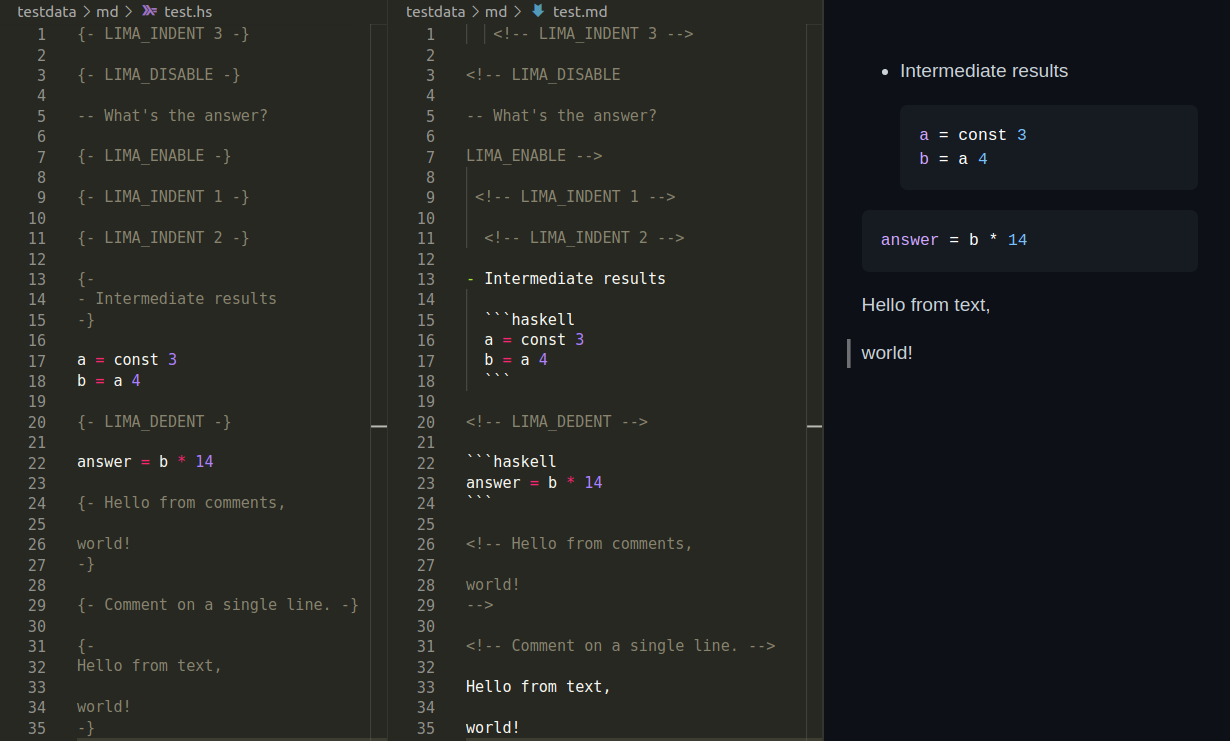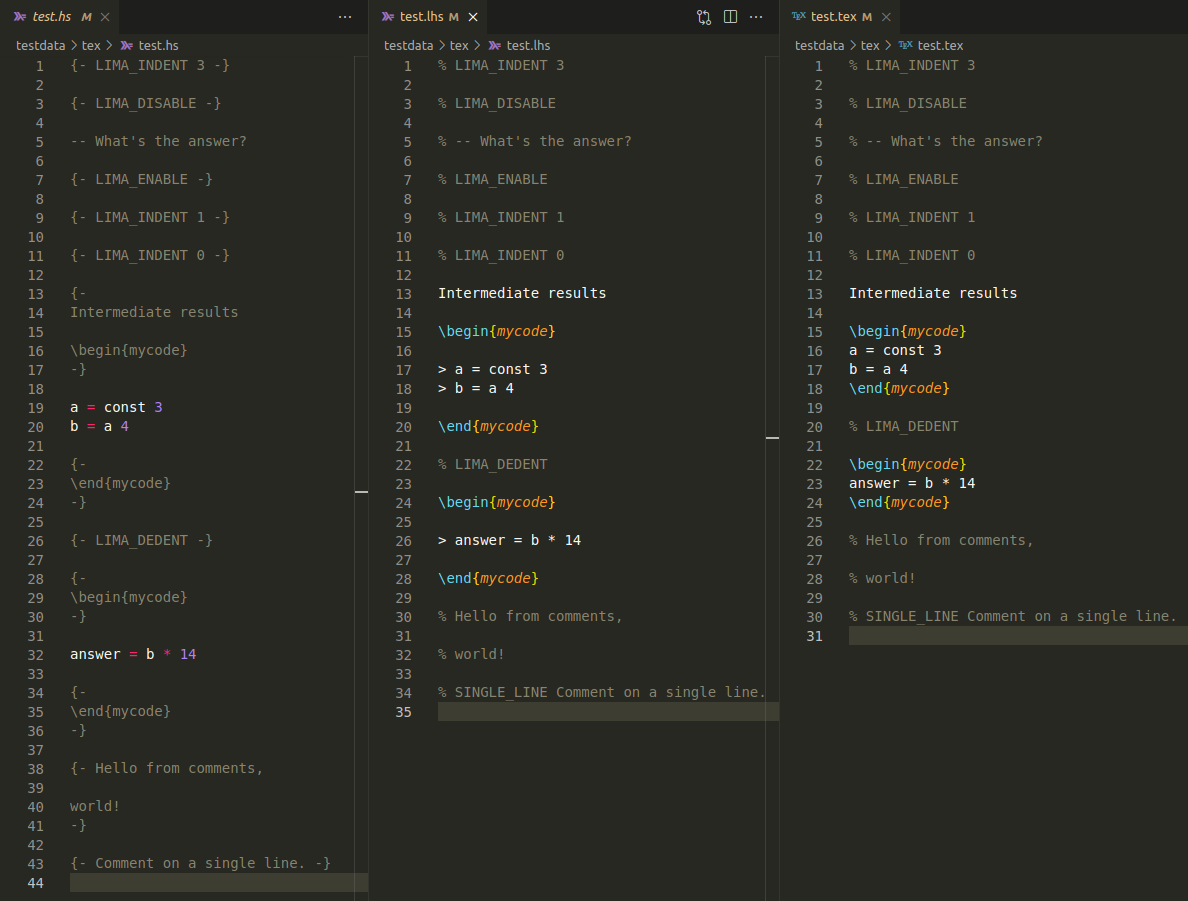https://github.com/deemp/lima
Convert between Haskell, Literate Haskell, Markdown, TeX
https://github.com/deemp/lima
haskell latex markdown
Last synced: 11 months ago
JSON representation
Convert between Haskell, Literate Haskell, Markdown, TeX
- Host: GitHub
- URL: https://github.com/deemp/lima
- Owner: deemp
- License: other
- Created: 2023-04-04T17:07:20.000Z (almost 3 years ago)
- Default Branch: main
- Last Pushed: 2023-10-06T00:39:42.000Z (over 2 years ago)
- Last Synced: 2025-01-11T11:47:30.942Z (about 1 year ago)
- Topics: haskell, latex, markdown
- Language: Haskell
- Homepage: https://hackage.haskell.org/package/lima
- Size: 738 KB
- Stars: 2
- Watchers: 1
- Forks: 0
- Open Issues: 2
-
Metadata Files:
- Readme: README.md
- Changelog: CHANGELOG.md
- License: LICENSE
Awesome Lists containing this project
README
# lima
Sync your `README` with your `Haskell` codebase.
## Supported formats
Convert files between:
- `Haskell` (`.hs`)
- `Literate Haskell` (`.lhs`)
- `GitHub Flavored Markdown` (`.md`)
- `TeX` (`.tex`)
## Related works
- [LiterateMarkdown](https://hackage.haskell.org/package/LiterateMarkdown) - `lima` is a fork of this abandoned project.
- [pandoc](https://hackage.haskell.org/package/pandoc) - [supports](https://www.uv.es/wikibase/doc/cas/pandoc_manual_instalado.wiki?60) `Literate Haskell` and a ton of other formats.
- [IHaskell](https://hackage.haskell.org/package/ihaskell) - create `Jupyter` notebooks with `Haskell` code cells and `GitHub Flavored Markdown` text cells.
- [lhs2tex](https://hackage.haskell.org/package/lhs2tex) - convert `Literate Haskell` to `TeX`.
- [agda2lagda](https://hackage.haskell.org/package/agda2lagda) - Generate a literate Agda/Haskell script from an Agda/Haskell script. Produces LaTeX or Markdown literate scripts.
- [markdown-unlit](https://hackage.haskell.org/package/markdown-unlit) - `markdown-unlit` is a custom unlit program. It can be used to extract Haskell code from Markdown files.
- [unlit](https://hackage.haskell.org/package/unlit) - Tool to convert literate code between styles or to code.
- [design-tools](https://github.com/isovector/design-tools) - a Pandoc filter for building a book from Markdown.
- [literatex](https://hackage.haskell.org/package/literatex) - transform literate source code to Markdown
## Scope
`lima` focuses on converting documents between formats and allows to concatenate documents.
Other scenarios, e.g., inlining a document into a document, may require specialized tools.
## Demo
### Markdown
[.hs](./testdata/md/test.hs) and [.md](./testdata/md/test.md)

### TeX
[.hs](./testdata/tex/test.hs) and [.lhs](./testdata/tex/test.lhs) and [.tex](./testdata/tex/test.tex)

## Ideas
- A document is a text in a supported format.
- I introduced tags into supported formats.
- E.g., in `.hs` documents, tags are multiline comments written on a single line like '`{- LIMA_ENABLE -}`'.
- Tag names are configurable.
- A user may set '`on`' instead of '`LIMA_ENABLE`'.
- A document can be parsed into a list of tokens.
- Tags affect document parsing.
- The tokens can be printed back to that document.
- Formatting a document is printing a parsed document back to itself.
- Formatting is idempotent. In other words, formatting the document again won't change its content.
- The `lima` library provides a parser and a printer for each supported format.
- A composition of a printer after a parser produces a converter.
- Such a converter is usually invertible for a formatted document.
- Converting a document `A` to a document `B`, then converting `B` to `A` doesn't change the content of `A`.
## Suggested setup
1. Create a test suite. `README.hs` may be its main file.
1. Add `lima` and `text` to its dependencies.
1. Create a test module. It may have the following content.
```haskell
import Lima.Converter (Format (..), convertTo, def)
import Data.Text.IO qualified as T
main :: IO ()
main = T.readFile "README.hs" >>= T.writeFile "README.md" . (Hs `convertTo` Md) def
```
This package has three such test suites:
- [readme](README.hs) converts `README.hs` to `README.md`. `README.hs` is its main file.
- [readme-hs-to-md](test/HsToMd/Main.hs) converts `README.hs` to `README.md`.
- [readme-md-to-hs](test/MdToHs/Main.hs) converts `README.md` to `README.hs`.
## Suggested workflow
Here's a suggested workflow for `Haskell` and `Markdown`:
1. Edit the code in a `README.hs` using [Haskell Language Server](https://github.com/haskell/haskell-language-server).
1. Convert `README.hs` to a `README.md`. Comments from `README.hs` become text in `README.md`.
1. Edit the text in `README.md` using [markdownlint](https://github.com/DavidAnson/markdownlint).
1. Convert `README.md` back to the `README.hs` to keep files in sync. Text from `README.md` becomes comments in `README.hs`.
1. Repeat.
## Contribute
Clone this repo and enter `lima`.
```console
git clone https://github.com/deemp/lima
cd lima
```
### cabal
Build
```console
cabal update
cabal build
```
### nix
1. [Install](https://github.com/deemp/flakes/blob/main/README/InstallNix.md) `Nix`.
1. Run a devshell and build `lima` using the project's `cabal`:
```console
nix develop nix-dev/
cabal build
```
1. Optionally, start `VSCodium`:
```console
nix run nix-dev/#writeSettings
nix run nix-dev/#codium .
```
1. Open a `Haskell` file there, hover over a term and wait until `HLS` shows hints.
1. [Troubleshoot](https://github.com/deemp/flakes/blob/main/README/Troubleshooting.md) if necessary.